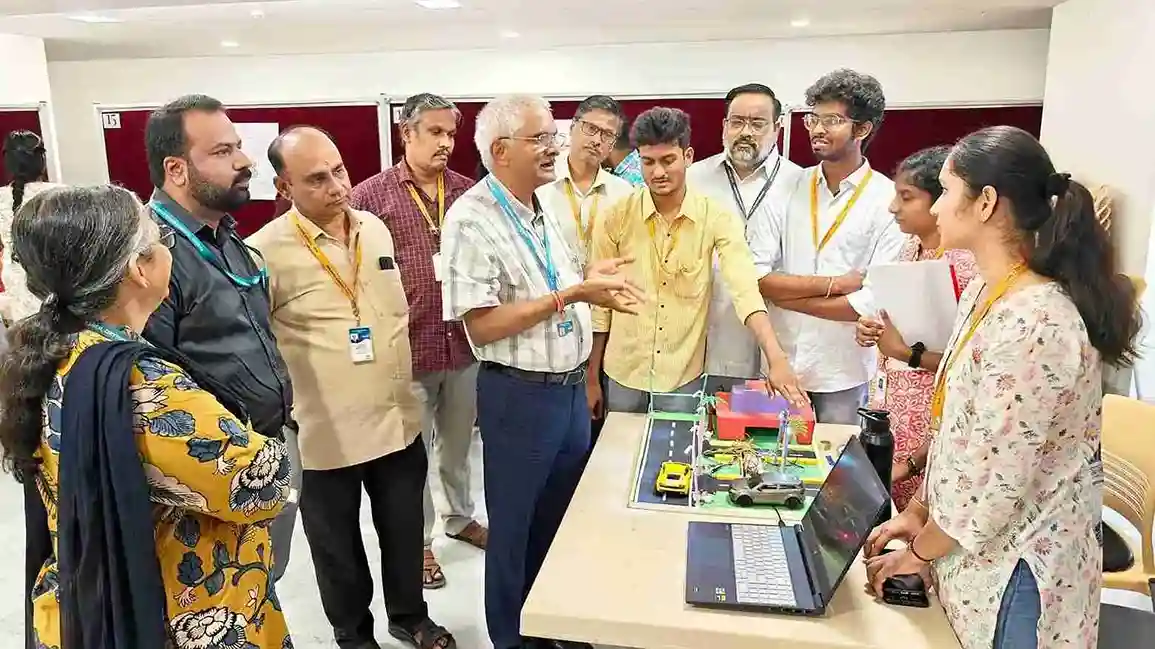The Apollo University Innovation Project Expo 2025 Highlights Advancing Student Ingenuity and Applied Technology

The Apollo Innovation Project Expo 2025, organized by the School of Technology, The Apollo University, was held on 30th October 2025 at the Dr. PCRKC Auditorium, where students presented a series of technically adept and socially relevant innovations. The expo was inaugurated by Professor M. Potharaju, Registrar of the University, who interacted with the student exhibitors and encouraged them to continue advancing their ideas towards practical implementation and future deployment. Senior academic members including Dr. Ramya Ramakrishnan, Associate Dean, AIMSR, Dr. SethuramaSubbaiah, Controller of Examinations, Dr. D. Jagadeesan, Dean, School of Technology, Prof. K. Bhaskar Reddy, Dean, School of Health Sciences, and Dr. Jinto Mathew, Vice Principal, College of Nursing, were present and engaged with project demonstrations, offering insightful observations and recommendations. Faculty coordinators Dr. K. Thirumalesu, Dr. C. Pakkiraiah, Mrs. N. Keerthi, and Mr. M. Kamalahasan ensured the seamless conduct of the event.
In his address, the Registrar, Professor M. Potharaju, remarked that innovation has always been an area close to his heart and expressed his appreciation for the School of Technology for sustaining this culture with commitment and continuity. He noted that the project expo stands as one of the School’s most impactful academic practices, as it consistently encourages students to translate ideas into meaningful prototypes. Highlighting the growth in participation, he observed that the number of projects presented has increased from twelve in the previous year to fourteen this year, reflecting a steady strengthening of innovation momentum. He emphasized that this is only the beginning of a longer journey, and encouraged students to further refine their projects and progress towards patenting with the support of the Institution’s Innovation Council.
Prof. Potharaju added that the university’s incubation facility and collaborative workstations are always available to nurture promising prototypes emerging from faculty-led student teams. The Registrar concluded by stating that the intended outcome of such initiatives is to shape students not only as skilled professionals but as future entrepreneurs contributing to the innovation landscape of India. He further suggested that, from the next year onward, the Project Expo should be expanded to include all institutions and schools within Apollo Knowledge City, enabling wider participation and providing a larger platform for diverse and innovative ideas to emerge and be shared.
Fourteen projects were presented, each addressing practical concerns ranging from public safety and environmental monitoring to automation, education, and intelligent systems. LightX, a smart street light system using light and infrared sensors, demonstrated automated brightness control based on time and pedestrian movement to reduce electricity consumption and operational inefficiencies in public lighting infrastructure. The Smart Safety Helmet, HeadGear, integrated temperature, humidity, gas, and obstacle detection sensors with live data visualization and cloud connectivity to improve worker safety in industrial and mining environments. An IoT-based Rockfall and Landslide Early Warning System monitored ground conditions using vibration, tilt, and moisture sensors and issued alerts through connected networks for use in geologically unstable regions. Time optimisation in academic environments was addressed through a multimodal AI-based attendance management system capable of eliminating manual recording and enhancing accuracy.
Home and personal technology applications were represented through TapNGo, a web-based home automation model developed using ESP32, and a gesture-controlled calculator that allowed users to perform calculations through hand movements detected via computer vision. SMART HYDRA demonstrated automated irrigation control based on real-time soil moisture levels to support water conservation in agriculture. The Student Issue Ticketing Platform showcased a structured grievance management system that enables students to raise and track service requests with transparent resolution workflows across institutional departments.
Interactive and experiential systems also drew strong interest, with GESTURAX enabling video-game control through hand gestures, and the Wireless Notice Board allowing real-time communication updates via wireless transmission to digital display boards. The Automatic Lane Priority System for Emergency Vehicles offered a mechanism for dynamic traffic signal control to enable unobstructed emergency response movement. Vocal Bot demonstrated voice-activated robotic control, while Digital Number Quest presented a mathematics learning interface that encourages logic development and reduces learning anxiety among students. The Buzzer Test provided a hands-on circuit-based dexterity game designed to build hand-eye coordination and familiarity with basic electrical systems.
The expo recorded substantial participation from students, faculty members, observers, and research scholars, with each project team articulating the conceptual basis, system design, and possible future development of their work. The interactions throughout the event reflected clarity of technical understanding, practical orientation, and thoughtful consideration of scalability and applicability. The event concluded with acknowledgements to all contributors and an overall recognition of the students’ commitment to innovation guided by systematic inquiry and structured experimentation.
